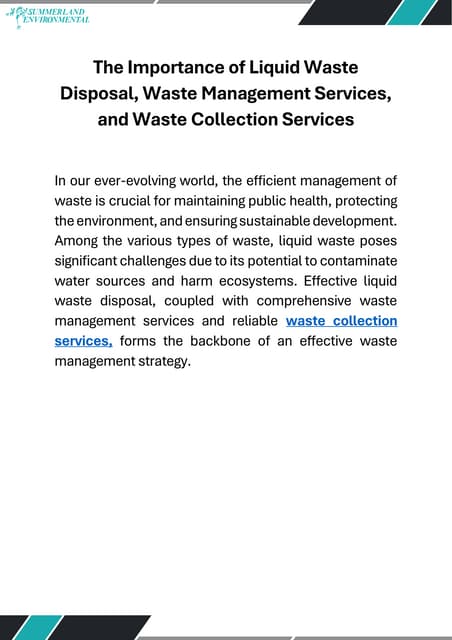Get This Report on Reclaim Waste
Get This Report on Reclaim Waste
Blog Article
The Main Principles Of Reclaim Waste
Table of ContentsThe Greatest Guide To Reclaim WasteReclaim Waste Can Be Fun For EveryoneLittle Known Questions About Reclaim Waste.Reclaim Waste - An OverviewReclaim Waste for Dummies
Check out the types, events, and types of fluid waste. Domestic sewer waste describes the waste and items from a residential sewage-disposal tank. This type of waste is created by human beings in residences, institutions, and various other structures. This only consists of septic storage tanks that have a drainpipe area. The correct management and disposal of residential sewer waste need fluid waste to be transferred to a sewage treatment plant where the proper methods and tools are put on purify and get rid of waste.
Commercial waste typically includes potential threats, such as flammable products or a mixture of liquid and solid waste items, and needs an advanced and in-depth disposal process. The disposal of business waste normally includes the purification of waste before transport to make certain risk-free and appropriate disposal. Industrial waste is created from byproducts and overflow of industrial processes and production.
This sort of waste can not use the same sewage monitoring transport or procedures as septic or commercial liquids. The hazardous waste monitoring process needs the inspection and testing of fluid waste before it undertakes the disposal procedure (liquid waste disposal). Drainage waste is the fluid waste that originates from runoff and excess stormwater in very inhabited areas or cities
Overflow waste can create contamination and flooding otherwise managed effectively. Discover a lot more concerning drain cleaning and waste monitoring. Ensuring appropriate waste administration can prevent catastrophes and minimize ecological damage. Both people in domestic setups and professionals in commercial or production markets can take advantage of comprehending the processes and laws of fluid waste management.
Reclaim Waste Can Be Fun For Everyone
Call PROS Solutions today to find out regarding our waste administration and disposal solutions and the appropriate means to look after the fluid waste you produce.
(https://share.evernote.com/note/7e2c20e2-4e08-1523-1aa2-d06cf7e27761)Do you understand what takes place to your water when you end, flush the toilet or drain pipes the cleaning device? No? Well, it's worth recognizing. This so-called 'wastewater' is not just an essential source yet, after treatment, will be launched to our land, waterways or the sea. Utilized water from toilets, showers, bathrooms, kitchen sinks, washings and industrial procedures is understood as wastewater.

water utilized to cool equipment or clean plant and equipment). Stormwater, a kind of wastewater, is drainage that streams from agricultural and city areas such as roofings, parks, yards, roadways, courses and seamless gutters right into stormwater drains pipes, after rainfall. Stormwater flows untreated directly to regional creeks or rivers, at some point getting to the sea.
The Best Guide To Reclaim Waste
In Queensland, many wastewater is dealt with at sewage treatment plants. Wastewater is transported from domestic or industrial sites with a system of drains and pump terminals, recognized as sewerage reticulation, to a sewage treatment find out this here plant. City governments construct, preserve and operate most sewage treatment plants. Operators are licensed under the Environmental Defense Act 1994 to discharge treated wastewater at an appropriate ecological requirement right into rivers.
The Department of Natural Resources recommends local governments regarding managing, operating and maintaining sewage systems and treatment plants. In unsewered locations, city governments might need owners to install private or family sewer treatment systems to deal with domestic wastewater from toilets, cooking areas, shower rooms and washings. The Department of Natural Resources authorizes the use of household systems when they are confirmed to be efficient.
In some new class, treatment of some stormwater to get rid of litter, sand and gravel has actually started using gross contaminant catches. Wastewater therapy occurs in four phases: Removes strong issue.
Wastewater then moves into huge storage tanks where solids resolve and are gotten rid of as sludge. Grease and scum are skimmed from the surface area. Makes use of little living microorganisms referred to as micro-organisms to break down and eliminate staying liquified wastes and great fragments. Micro-organisms and wastes are incorporated in the sludge. Gets rid of nitrogen and phosphorus nutrients that could create algal flowers in our rivers and endanger aquatic life.
Things about Reclaim Waste
Nutrient removal is not readily available at all sewage therapy plants because it calls for expensive specialised tools. Clear fluid effluent created after therapy may still contain disease-causing micro-organisms - liquid waste removal.

Many wastewater flows into the sewerage system. Under the Act, local governments provide approvals and licences for eco pertinent activities (Periods) involving wastewater launches that may have a regional impact.
What Does Reclaim Waste Do?
Tracking supplies valid information about water quality and can confirm that licence problems are being fulfilled. The information obtained through tracking gives the basis for making water quality decisions.
Report this page